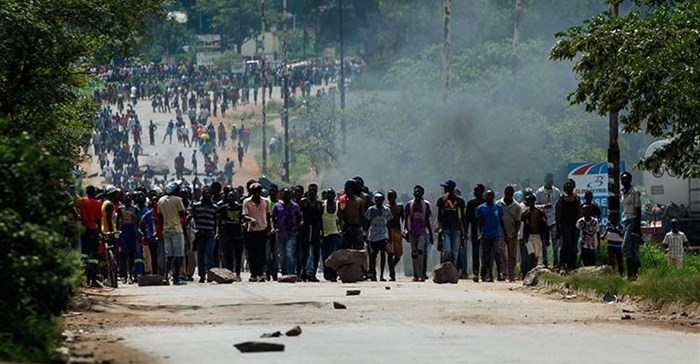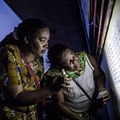The Committee to Protect Journalists joined more than 20 rights organisations and the #KeepItOn Coalition to call for authorities in Zimbabwe to restore internet and social media services, commit to maintaining internet access, and encourage accountability from telecommunication and internet service providers to respect human rights.

Protesters block the main route to Zimbabwe's capital Harare from Epworth township on January 14, 2019, after the government more than doubled the price of fuel. On January 15, CPJ joined more than 20 rights organizations and the #KeepItOn Coalition to call for authorities in Zimbabwe to restore internet and social media services. Credit: CPJ/AFP/Jekesai Njikizana.
The letter, addressed to Kazembe Kazembe, Zimbabwe's minister of information communication technology and cyber security, emphasised how internet disruptions inhibit journalists' ability to contact sources, gather information, and file stories.
The letter also detailed the additional social and economic costs of internet outages, as well as how such disruptions run contrary to international law.
"The government in Zimbabwe should take action to ensure a free and open media environment, which means swiftly reestablishing internet and social media access," said CPJ Africa program coordinator Angela Quintal.
"African governments too often use internet disruptions as a tool to stifle the free flow of news and commentary."
In the letter, the #KeepItOn Coalition points out that research shows that internet shutdowns and violence go hand in hand; and that internet shutdowns violate international law.
The letter goes on to say: “Shutdowns disrupt the free flow of information and create a cover of darkness that shields human rights abuses from public scrutiny. Journalists and media workers cannot contact sources, gather information, or file stories without digital communications tools.
“Justified for various reasons, shutdowns cut off access to vital information, ecommerce, and emergency services, plunging whole communities into fear.
“Disruptions also destabilise the internet’s power to support small business livelihoods and to drive economic development. A 2016 study by the Brookings Institution, a prominent think tank, revealed that shutdowns drained $2.4 billion from the global economy between 2015 and 2016.
“The open internet has fostered unprecedented creativity, innovation, and access to information and to other kinds of social, economic, cultural, and political opportunities across the globe. The technical means used to block access to information online often dangerously undermine the stability and resiliency of the internet.
“Internet shutdowns must never be allowed to become the new normal. The current economic crisis in Zimbabwe will be further exacerbated by internet shutdowns.We estimate the shutdown will cost your country $5,742, 421 per day in direct economic costs, and will slow the realisation of economic, social, and cultural rights broadly.”
The letter concludes with a call to the Zimbabwean government to:
- Ensure that the internet, including social media, is restored.
- Publicly declare your commitment to keep the internet on, and to notify the public of any disruptions.
- Encourage telecommunications and internet services providers to respect human rights through public disclosures on policies and practices impacting users.
Read the full letter here.













